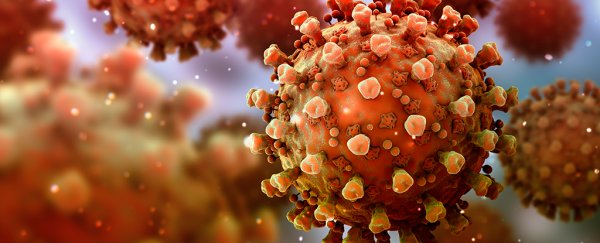Among the million or so lives lost to COVID-19 there are stories that defy understanding. Healthy bodies, young and in their prime, succumb to the virus as easily as if they were among the most vulnerable. While for others in their age group, the virus only produces mild symptoms - if any.
Across two new studies, researchers have identified a crucial immune system mechanism that could help explain why the virus is so lethal - but only for some people.
The research also offers the first molecular explanation for why men seem to be impacted by the virus more severely than women.
Both papers point to type I interferons (IFNs) as playing a role in this crucial difference in COVID-19 outcomes. IFNs are proteins that infected cells produce in order to help stop the spread of whatever's infecting them.
But, for some people, their job is interrupted.
One of the new studies showed that more than 10 percent of healthy people who ended up with severe COVID-19 symptoms have antibodies that attack the patient's own IFNs and stop them properly fighting the SARS-CoV-2 virus.
The other study looked at patients who were hospitalised with severe symptoms - some of them still in their 20s - and found that at least another 3.5 percent of carried genetic mutations that stop IFNs working properly.
While this potential mechanisms would only explain a proportion of COVID-19's most serious cases, it just might be a discovery that could still save tens, if not hundreds of thousands of lives.
"These findings provide compelling evidence that the disruption of type I interferon is often the cause of life-threatening COVID-19," says physician Jean-Laurent Casanova, head of the St. Giles Laboratory of Human Genetics of Infectious Diseases at The Rockefeller University.
"And at least in theory, such interferon problems could be treated with existing medications and interventions."
Collaborating with a large international team of researchers as part of the COVID Human Genetic Effort, Casanova and his colleagues identified an antibody that errantly neutralised one or more of their body's own IFN proteins in at least 101 of the 987 COVID-19 patients they tested (10.2 percent).
It's not the first time we've seen the immune system sabotage itself and stop interferons from doing their jobs properly. Some bacterial infections, such as those caused by species of Staphylococcus, often increase in severity when the body's production of antibodies turn against its own interferon defence.
This self-sabotage has been noted in people treated with interferon for infections such as hepatitis, as well as in women with the autoimmune disease lupus.
Finding it just might explain as many as one in 10 of COVID's most life-threatening, providing not just a means of treatment, but of better identifying who in our community is most at risk.
It also goes some way to explaining another perplexing coronavirus mystery.
"Interestingly, 94 percent of patients with these neutralising auto-antibodies were male, which may explain why men are more susceptible to getting severe COVID-19," says Stuart Tangye, head of the Oceania node of the COVID Human Genomic Effort.
The second study found genes for the interferon proteins themselves could also be working against the body's interests.
Comparing the genes of 659 patients with life-threatening cases of COVID-19 with 534 individuals with asymptomatic or benign infections resulted in the identification of 13 abnormalities in sequences known to be integral to IFN's anti- influenza activity.
These 'loss of function' mutations were only spotted in 23 of the patients, or around 3.5 percent of the group, but the research makes a strong case that even in this small fraction of the population, a breakdown in this critical immune pathway could be deadly in an otherwise healthy patient.
"The way SARS-CoV-2 affects people differently has been puzzling. The virus can cause a symptom-free infection and go away quietly, or it can kill in a few days," says medical geneticist John Christodoulo from the Murdoch Children's Research Institute in Australia.
"The changes compromised their ability to protect against COVID-19 infection by impairing patients' ability to make type I interferon."
Combined, the two studies fill in critical pieces of the coronavirus puzzle, clarifying how it invades and destroys in a seemingly whimsical manner.
Better treatments and diagnostics aside, they also expose a familiar side to the virus: One though deadly, isn't entire novel.
As significant as the findings are, it's hard not to think of the vast numbers of dead who only recently were in peak health, confident that they were among the fraction who'd suffer little, if at all.
Among them, there are still mysteries to be solved.
